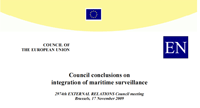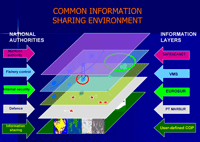 The European Union has for a number of years been focusing on ways to enhance what the US calls “Maritime Domain Awareness” via increased collaboration among relevant stakeholders. As European Commissioner for Maritime Affairs and Fisheries Joe Borg commented: “For maritime surveillance to work as well as it can, it needs to be comprehensive, cross border and cross-sectoral. We need systems which can draw on all available means.. The existing obligations in this area at EU level are many and varied, and our vessel monitoring systems are increasingly sophisticated. However, they tend to monitor a specific area focusing on one single activity instead of having a overall view on the many activities that are simultaneously carried out at sea. . We need to work towards the full interoperability of the various systems, and this new working document identifies precisely what needs to be done next in order to realise that vision.”
The European Union has for a number of years been focusing on ways to enhance what the US calls “Maritime Domain Awareness” via increased collaboration among relevant stakeholders. As European Commissioner for Maritime Affairs and Fisheries Joe Borg commented: “For maritime surveillance to work as well as it can, it needs to be comprehensive, cross border and cross-sectoral. We need systems which can draw on all available means.. The existing obligations in this area at EU level are many and varied, and our vessel monitoring systems are increasingly sophisticated. However, they tend to monitor a specific area focusing on one single activity instead of having a overall view on the many activities that are simultaneously carried out at sea. . We need to work towards the full interoperability of the various systems, and this new working document identifies precisely what needs to be done next in order to realise that vision.”
In a report published in October 2009, the European Commission underscored the importance of enhanced information sharing in shaping joint decision making in the maritime security area. The Commission underscored that “the aim of integrated maritime surveillance is to generate a situational awareness of activities at sea impacting on maritime safety and security, border control, the marine environment, fisheries control, trade and economic interests of the European Union, as well as general law enforcement and defence so as to facilitate sound decision making. Maritime situational awareness is the effective understanding of activity associated with the maritime domain that could impact the security, safety, economy, or environment of the European Union and its Member States. On the basis of clearly defined user needs and rights, it assists the authorities responsible for monitoring and surveillance activities in preventing and managing in a comprehensive way all such situations, events and actions related to the EU maritime domain.”

This publication has since been followed up with a European Council decision on November 17 2009 to push the conclusions of the report. The Council decision underscored that “the potential for further interoperability, and where relevant, of assessing the need for sharing of information for maritime surveillance – civilian as well as military –, to attain an efficient and cost-effective way to achieve a comprehensive maritime situational awareness, and that a well coordinated, cross-sector approach based on the lawful exchange of maritime surveillance data – with full respect of applicable rules of data and information sharing – is necessary in order to make Europe safer, more secure, more environmentally friendly, more attractive, more efficient and more competitive.”
As the Obama Administration re-affirms its support for maritime security efforts initiated under the last Administration, these European developments provide an important contribution to building an effective maritime security regime. Current USCG role and efforts both reinforce and draw upon such European efforts.
———-
***Posted December 8th, 2009

